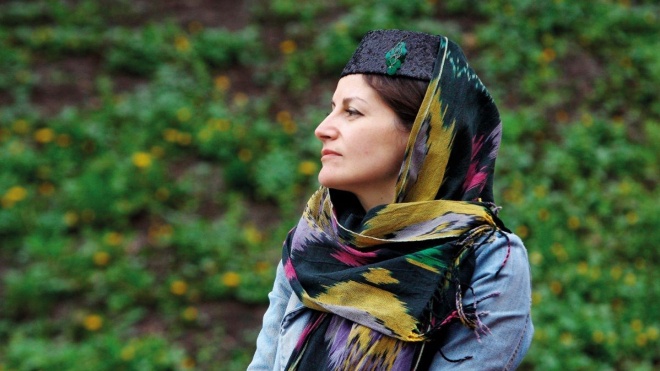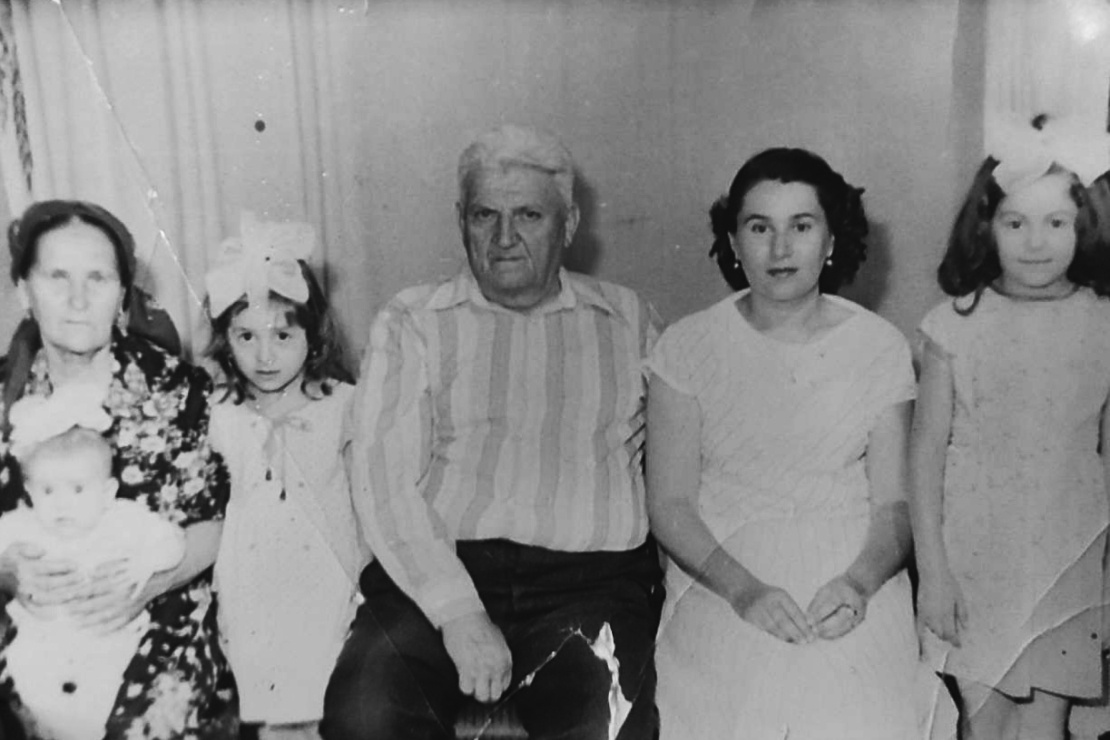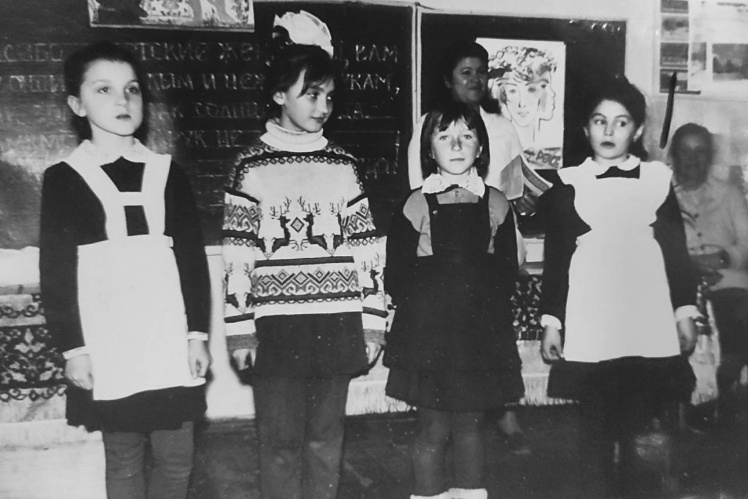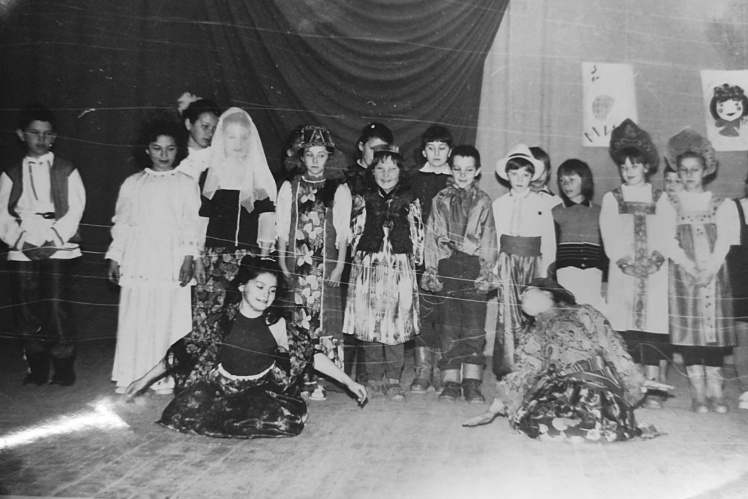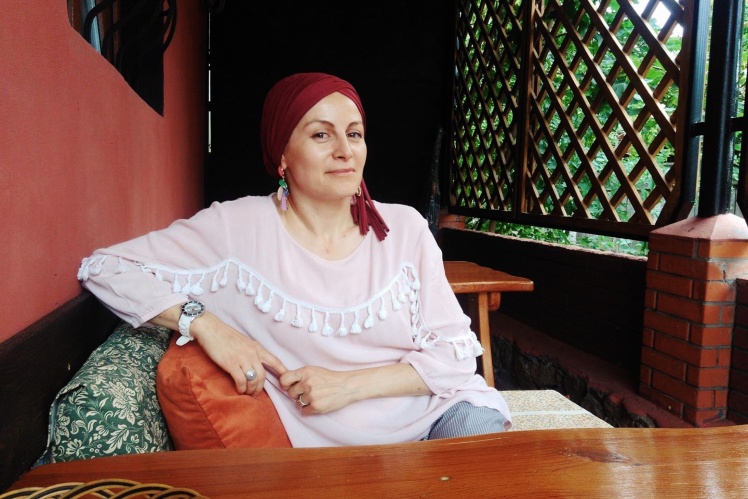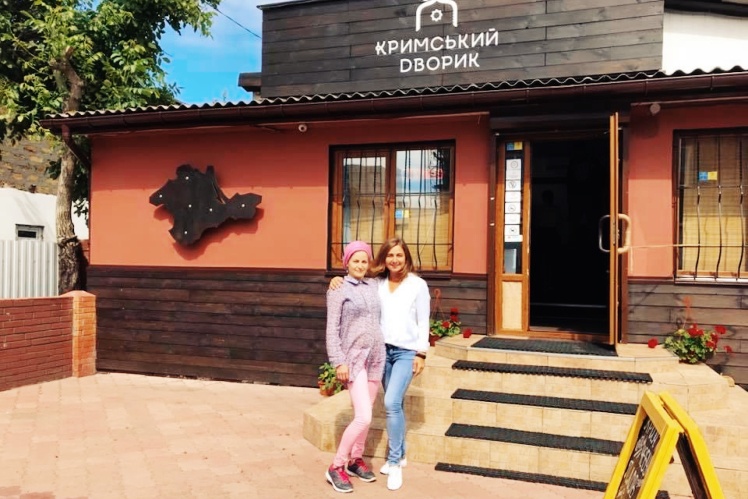Lerane
Lerane is 42 years old, Lviv is her fourth home. Seven years ago, on January 18, 2016, Lerane left Crimea due to the Russian occupation and moved to Irpin, Kyiv suburb. In March 2022, she had to flee from there, again because of the Russians.
Leraneʼs family in Uzbekistan a few days before leaving for Crimea. From right to left: grandmother Medine with baby Elvira, sister Urjane, grandfather Set-Yaya, mother Musine, and Lerane.
Леране Хайбулаєва / «Бабель»
Lerane was born in Uzbekistan. The Bolsheviks deported her family there in 1944.
"I wasnʼt told much about life in Crimea before 1944," recalls Lerane. “Both families were stripped of their posessions. The Uzbeks were scared [by Russians] that the Crimean Tatars “have hornes an hooves”, but those who came had the same religion and similar language.
The fact that the Lerane family ended up together in Uzbekistan can be considered a miracle. Relatives on her motherʼs side lived in Sudak (a town in Crimea) and grew tobacco. During the deportation, part of the family died in freight cars on the way to Uzbekistan. Relatives on the fatherʼs side were sent to Siberia. Used to the warm south, they came there in light clothes and almost froze. They worked at sawmills, and later were able to go to Uzbekistan.
Lerane (far right) at school. Lerane (bottom left) in a Crimean Tatar costume at a school holiday.
Леране Хайбулаєва / «Бабель»
In 1987, the Crimean Tatars were allowed to return to the peninsula. Leraneʼs father went to look for a place to live. The following year, the whole family flew to Simferopol.
“The plane was full of Crimean Tatar women, children and elderly people,” recalls Lerane. “Crimean Tatar men met us at some remote terminal, I ran to meet them and shouted ʼBaba! Baba!ʼ”
Lerane with her younger sister Uryane in front of a house in the village in Dzhankoy district, Crimea.
Леране Хайбулаєва / «Бабель»
Lerane was eight years old then. The family lived in a small steppe village near Dzhankoy — at first, little Lerane didnʼt understand why it was necessary to move from a wealthy Uzbek home. In the evenings, grandmothers told family stories. About grandfather Memet, who died before Lerane was born, collected Crimean Tatar musicians in an Uzbek village because he longed for the Motherland. And the grandmotherʼs second husband, Set-Yaya, went through the Second World War, but he never talked about it and never took his army coat out of the closet.
Occupation
Lerane graduated from the Faculty of Journalism, worked in local newspapers. She went into advertising, and then decided to work in sales. In 2014, she lived in Simferopol, sold cars in a showroom, and was far from being a political activist.
On the morning of March 3, 2014, a crying Zarina, the wife of her neighbor Reshat Ametov, ran to Lerane. That morning, he was forced into a car — and then disappeared.
“I started looking for Reshat together with his family,” recalls Lerane. “He did an extraordinary act — went on a single picket against the occupation, although he was not a member of the Mejlis, Crimean Tatar local parliament. And I wrote on my page [in a social network] every day how the search was progressing, gave interviews when his wife had difficulty speaking, and acted as her translator for foreign journalists.”
Hundreds of Ukrainian women and several men hold a demonstration in support of peace and preservation of a united Ukraine on March 8, 2014 in Bakhchisarai.
Getty Images / «Babel'»
Reshatʼs badly beaten body was found on March 15. And the very next day, a pseudo-referendum on "joining Russia" was held in Crimea. Leraneʼs family immediately said: there will be another “44th year” and a new generation of Crimean Tatars without Crimea. Arrests and disappearances began.
Leraneʼs neighbor, who worked in the SBU, in a few months after the annexation started working for the Russian FSB. For a year, his mother had casually warned Leraneʼs family to be careful. Lerane herself didnʼt think about fear — she volunteered for the Ukrainian military, looked for medicine among the diaspora in the USA, sent clothes to volunteers in Kharkiv by train. But her mother persuaded her to leave the Crimea.
“I thought I wouldnʼt find my place in Kyiv,” she recalls.
Lerane with Crimean Tatar chebureks.
Леране Хайбулаєва / «Бабель»
Lerane opened a cheburek place on the outskirts of the city, although she had no experience in this field. She made and sold them by herself. She befriended the Crimean Tatar community of Kyiv — went to rallies, cooperated with the Ministry of Information Policy of Ukraine, organized cultural events, helped prepare documents to confer the title of Hero of Ukraine on Reshat Ametov.
Irpin — Lviv
In 2018, Lerane moved to Irpin — and moved the business there. It was no longer just a cheburek place — a restaurant of Crimean Tatar cuisine Krymskyi dvoryk, A Crimean Yard. The restaurant is small — eight tables, each of which Lerane named after some Crimean city or town. She had her own Bakhchisarai, Sevastopol, and Sudak. Those who left the peninsula because of the occupation worked in Dvoryk.
“It was a place of longing for Crimea,” says Lerane. “I tried to make it look like my parentsʼ home.”
Lerane in "Krymskyi Dvoryk" in Irpin. In the yard of the "Krymskyi Dvoryk".
Леране Хайбулаєва / «Бабель»
Her aunt came from Crimea to cook. In the yard, cleared of garbage, Lerane planted wild grapes, like her parents above the gazebo. She put tapchan, as at home under a spreading walnut tree, where they made preserves and had dinner. One window of the restaurant looked out on the shell stone house, and the other looked out on the sign of the More store. They cooked according to family recipes: pilaf, sarma, baklava, ayran. Every morning Lerane bought greens and cheese at the market, and then spent almost the whole day chatting with the guests, explaining the features of dishes and Crimean Tatar cuisine in general. On the streets, she was greeted with “Salam alaikum!”.
Lerane prepares Crimean Tatar dishes.
Леране Хайбулаєва / «Бабель»
In August 2019, an acquaintance asked her to visit the military ward in the local hospital. Lerane visited combat medic Sasha, cooked for him. Despite the fact that he is ten years younger, they quickly found a common language and became friends, then they fell in love, and at the end of January 2022 they got married. And within a month, the Russians invaded the Kyiv region.
“Not to say that I experienced something special in Irpin. Unlike many, I was very lucky,” says Lerane about the first days of the full-scale war. She "only" delivered bread to pensioners under fire and was again forced to leave her "little Crimea" because of the Russians.
Lerane with Sasha and his son left Irpin on March 6. They went to Cherkasy. Sasha was looking for a way to join the army, and ended up in an airborne assault brigade. On the fourth of April he went to the front, and Lerane with their son moved to Lviv.
“Like people say nowadays: who said that I can withstand all this?” she smiles sadly. “I only have enough energy for a child now. Iʼm weak. I donʼt recognize myself. I have never felt this. I can cry in the Lviv minibus because the destroyed house is similar to the bombed-out house in Irpin.”
Destroyed houses in Irpin, April 18, 2022.
Getty Images / «Babel'»
Lerane was called abroad by acquaintances — they offered housing, a good job, she wouldnʼt get lost in the Crimean Tatar community there. Instead, she went to see her husband in the near-front Kramatorsk and pushed away the thought of whether she was a good mother in this case.
“I couldnʼt go when Sasha is here at the front,” says Lerane. “And I definitely wonʼt find a feeling of home anywhere abroad. And in general, Iʼm not in my homeland — how can I leave my country in addition to it?”
Despite feeling powerless, Lerane decided not to give up. She decided to try to restore her own business. In September, she planned to get involved as much as possible in the work of kiosk with Crimean Tatar street food. Samsa, Crimean shawarma roll, yantyks — she would have to cook and sell everything herself.
Леране Хайбулаєва / «Бабель»
But in September, Sasha was wounded near Izyum. She had to go to see him at the Kyiv hospital. There were few sales. Then blackouts started, and there were no funds for a generator. Sasha was discharged on December 15th, he came to Lviv, and on the same day Lerane closed the kiosk in order to spend as much time as possible with her husband.
She had hoped that the man with a disability and four contusions would stay behind, but he went back to his unit. He told her: “You wonʼt go anywhere, but the shame that I didnʼt go [to the frontline] will follow me for the rest of my life.” While Sasha is at the front, Lerane collects funds and ammunition for him and visits other soldiers in the hospital.
Lerane is waiting. For Sasha, for the opening of her restaurant of the Crimean cuisine, to the liberation of the peninsula.
Near the end she says:
“My mom and dad have never seen Sasha, but they are very worried about him. And the mother dreams that it is her son-in-law who will liberate her Crimea.”
Crimean Tatars at a memorial ceremony on the occasion of the 70th anniversary of the deportation near the mosque in Simferopol, May 18, 2014.
Getty Images / «Babel'»
Ghanna Mamonova contributed to the text. The piece was translated from Ukrainian by Anton Semyzhenko and Dmytro Raievskyi.
Babel will certainly tell about how the Crimean Tatars are returning to the Ukrainian Crimea. Wait for it with us: 🔸 in hryvnia 🔸 in cryptocurrency 🔸 via Patreon 🔸 or PayPal: [email protected].
